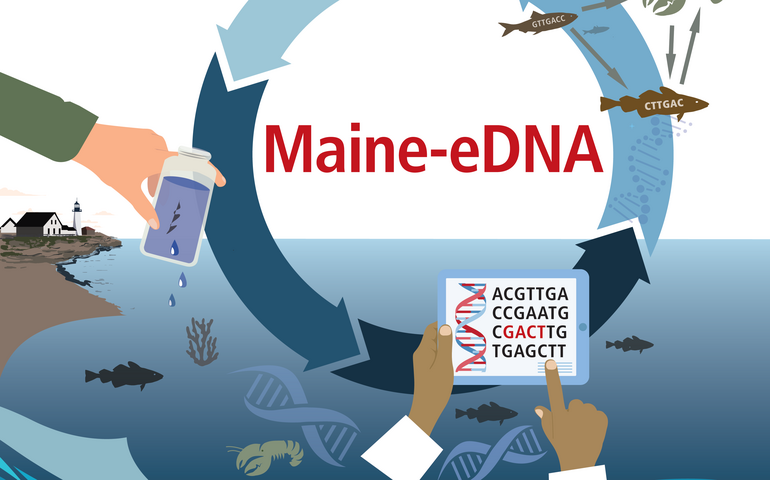Processing Your Payment
Please do not leave this page until complete. This can take a few moments.
- News
-
Editions
View Digital Editions
Biweekly Issues
- December 1, 2025
- Nov. 17, 2025
- November 03, 2025
- October 20, 2025
- October 6, 2025
- September 22, 2025
- + More
Special Editions
- Lists
- Viewpoints
-
Our Events
Event Info
Award Honorees
- Calendar
- Biz Marketplace
$20M project will monitor state's coastal ecosystem amid ocean changes
 Courtesy / University of Maine System
A $20 million, five-year initiative brings together research, education, government, community and economic development entities to study coastal waters through the use of environmental DNA, or eDNA.
Courtesy / University of Maine System
A $20 million, five-year initiative brings together research, education, government, community and economic development entities to study coastal waters through the use of environmental DNA, or eDNA.
The University of Maine and Bigelow Laboratory for Ocean Sciences, in East Boothbay, are co-leading a five-year initiative that aims to revolutionize environmental monitoring, ecological understanding and sustainability of coastal ecosystems.
A $20 million grant from the National Science Foundation will fund the project, which involves collaborators in research, education, government, community and economic development, and marine-related businesses statewide, according to a news release.
As the University of Maine’s marine laboratory, Darling Marine Center in Walpole will play a critical role in the project. DMC’s flowing seawater laboratories, fleet of research vessels and shore-side infrastructure will support the research, education, and business and workforce development activities at the core of this project.
“I’m really looking forward to expanded collaboration among DMC and Bigelow scientists, thanks to the National Science Foundation,” Heather Leslie, DMC director and UMaine associate professor in the School of Marine Sciences, said in the release. “We will be working together on science relevant to some of the state’s highest priorities, including sustaining marine fisheries, and reducing the vulnerability of marine-related businesses and coastal communities to climate and environmental change.”
Leslie is one of four co-principal investigators for the project, which involves more than 25 researchers in fields ranging from climate, ocean and environmental sciences to computer science and communication studies.
'eDNA'
The initiative is a large-scale effort to monitor aquatic life in coastal waters through the use of environmental DNA, or eDNA, according to a news release from Southern Maine Community College, which is also participating in the project.
SMCC will team up with Bigelow Laboratory and Colby College to use eDNA to monitor harmful algal blooms in Casco Bay. SMCC students will be involved in ocean field research through the Marine Science Seatime classes and for senior capstone projects.
“This is a wonderful opportunity for our students to use cutting-edge technology for real-world scientific research,” Marine Science Professor Brian Tarbox said in the release. “In collaboration with other institutions, we will be collecting data to monitor and gauge the sustainability of our marine ecosystems and how they are changing.”
The project leverages developments in the understanding of environmental DNA — genetic traces left behind by all plants, animals, and microbes. Even a small water sample contains a massive amount of this information, which provides the potential to construct a snapshot of the local ecosystem at any given time.
Marine resources
The emergence of eDNA research has been called vital to protecting and managing Maine’s marine resources and its fishing, lobstering, aquaculture and other marine industries that are major economic contributors to the state.
Last September, the Washington, D.C.-based American Geophysical Union, a nonprofit that represents 60,000 members in 137 communities, updated its 2005 statement on the importance of ocean research and education as foundations for economic growth with a call for urgent action to respond to a host of climate-related changes in the world’s oceans.
The report called for “bold investment” in scientific research to respond to rising sea levels and ocean temperatures and other changes that will impact coastal communities and their economies. Charles Colgan, a professor at the University of Southern Maine and a former Maine state economist, was one of a panel of five American Geophysical Union ocean scientist members that wrote the report. He told Mainebiz he’s particularly concerned about the ability of Maine’s coastal communities to respond to rising sea level.
Mainebiz web partners
Related Content

The Giving Guide
The Giving Guide helps nonprofits have the opportunity to showcase and differentiate their organizations so that businesses better understand how they can contribute to a nonprofit’s mission and work.
Learn More
Work for ME
Work for ME is a workforce development tool to help Maine’s employers target Maine’s emerging workforce. Work for ME highlights each industry, its impact on Maine’s economy, the jobs available to entry-level workers, the training and education needed to get a career started.
Learn More
Groundbreaking Maine
Whether you’re a developer, financer, architect, or industry enthusiast, Groundbreaking Maine is crafted to be your go-to source for valuable insights in Maine’s real estate and construction community.
Learn more-
The Giving Guide
The Giving Guide helps nonprofits have the opportunity to showcase and differentiate their organizations so that businesses better understand how they can contribute to a nonprofit’s mission and work.
-
Work for ME
Work for ME is a workforce development tool to help Maine’s employers target Maine’s emerging workforce. Work for ME highlights each industry, its impact on Maine’s economy, the jobs available to entry-level workers, the training and education needed to get a career started.
-
Groundbreaking Maine
Whether you’re a developer, financer, architect, or industry enthusiast, Groundbreaking Maine is crafted to be your go-to source for valuable insights in Maine’s real estate and construction community.
ABOUT
NEW ENGLAND BUSINESS MEDIA SITES
No articles left
Get access now
In order to use this feature, we need some information from you. You can also login or register for a free account.
By clicking submit you are agreeing to our cookie usage and Privacy Policy
Already have an account? Login
Already have an account? Login
Want to create an account? Register
Get access now
In order to use this feature, we need some information from you. You can also login or register for a free account.
By clicking submit you are agreeing to our cookie usage and Privacy Policy
Already have an account? Login
Already have an account? Login
Want to create an account? Register










0 Comments